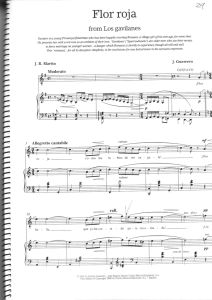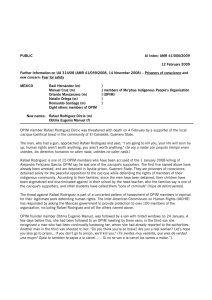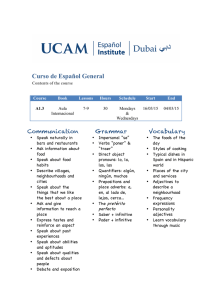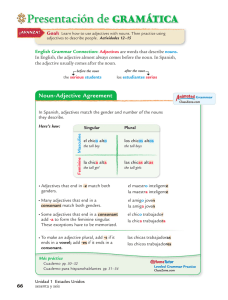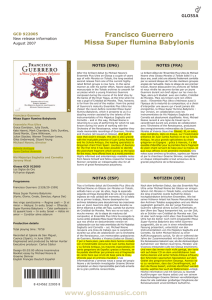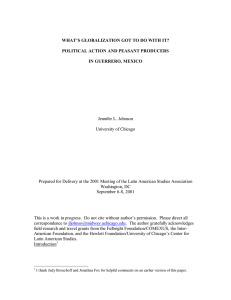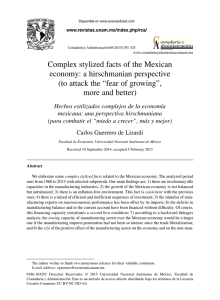Capítulo 2
Anuncio
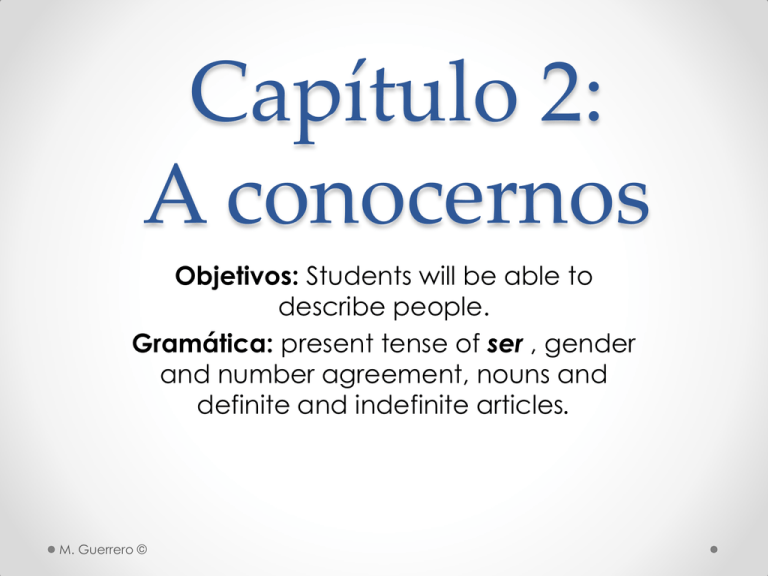
Capítulo 2: A conocernos Objetivos: Students will be able to describe people. Gramática: present tense of ser , gender and number agreement, nouns and definite and indefinite articles. M. Guerrero © Adjectives to describe someone • • • • • • • • • • • • • alto (a) bajo (a) moreno (a) rubio (a) pelirrojo (a) guapo (m) bonita (f) feo (a) serio (a) romántico (a) extrovertido (a) tímido (a) gracioso (a) M. Guerrero © • • • • • • • • • • • • • tall short dark-haired / dark-skinned blond red-headed good-looking / handsome pretty ugly serious romantic outgoing shy witty Adjectives to describe someone • • • • • • • • • • • aburrido (a) simpático (a) cómico (a) inteligente intelectual tonto (a) antipático (a) activo (a) atlético (a) trabajador (a) perezoso (a) o flojo / floja M. Guerrero © • • • • • • • • • • • boring friendly / nice funny intelligent intellectual silly / foolish unfriedly active athletic hard-working lazy Adjectives to describe someone • • • • • • • • • • • • interesante callado (a) delgado (a) gordo (a) travieso (a) rico (a) pobre débil fuerte generoso (a) joven (jóvenes for plural) viejo (a) M. Guerrero © • • • • • • • • • • • • interesting quiet thin fat mischievous rich poor weak strong generous young old Adjectives to describe someone • • • • hablador (a) tacaño (a) muy bastante • poco M. Guerrero © • • • • talkative stingy very quite, pretty (as in pretty tall) • a little ¡Hora de actividades! Time of activities! M. Guerrero © Adjective Pictures • Get one sheet of computer paper. Fold it in half four times, then unfold it. You will have sixteen squares on each side. • Put your name in the upper right hand box. • Select the 31 adjectives that you think will be the hardest for you to learn. (Don’t pick one that you already know.) • At the bottom of the other boxes, write one of these adjectives in SPANISH ONLY. Then, draw and color a picture that represents the word. (Someone who doesn’t know what the word means should be able to figure it out by looking at your picture.) Definite articles: 4 ways to say “the” • el – m.s. • la – f.s. • los – m.p. • las – f.p. M. Guerrero © Definite articles- examples • • • • _____ profesor. _____ profesora. _____ profesores. _____ profesoras. • • • • _____ amigo. _____ amiga. _____ amigos. _____ amigas. • • • • _____ muchacho. _____ muchacha. _____ muchachos. _____ muchachas. • • • • _____ compañero. _____ compañera. _____ compañeros. _____ compañeras. M. Guerrero © Definite articles- examples • • • • _____ estudiante. (m.s.) _____ estudiante. (f.s.) _____ estudiantes. (m.p.) _____ estudiantes. (f.p.) • • • • _____ señor. _____ señora. _____ señores. _____ señoras. M. Guerrero © • _____ señorita. • _____ señoritas. Indefinite articles: ways to say “a, an” or “some, a few” • • • • un – m.s. una – f.s. unos – m.p. unas – f.p. M. Guerrero © • • • • a, an a, an some, a few some, a few Indefinite articles- examples • • • • _____ profesor. _____ profesora. _____ profesores. _____ profesoras. • • • • _____ amigo. _____ amiga. _____ amigos. _____ amigas. • • • • _____ muchacho. _____ muchacha. _____ muchachos. _____ muchachas. • • • • _____ compañero. _____ compañera. _____ compañeros. _____ compañeras. M. Guerrero © Indefinite articles- examples • • • • _____ estudiante. (m.s.) _____ estudiante. (f.s.) _____ estudiantes. (m.p.) _____ estudiantes. (f.p.) • • • • _____ señor. _____ señora. _____ señores. _____ señoras. M. Guerrero © • _____ señorita. • _____ señoritas. In Spanish, most of the time the noun comes first, and then followed by the adjective. PLUS In Spanish, adjectives and articles must agree with the nouns in terms of GENDER and NUMBER. If the noun is plural, the articles and adjectives must be plural, as well. Examples: the mean boy el muchacho antipático the mean boys los muchachos antipáticos The mean girl La muchacha antipática The mean girls Las muchachas antipáticas Rules for making nouns and adjectives plural: If it ends in a vowel, add an "s." la muchacha fea (the ugly girl) (change to the plural article "the") las muchachas feas (the ugly girls) If it ends in a consonant, add an "es." el muchacho hablador (the talkative boy) los muchachos habladores (the talkative boys) How to ask what someone is like • ¿Cómo es Pedro ? • What is Pedro like? o Pedro es alto. También o Pedro is tall. He is es inteligente. also intelligent. • ¿Cómo eres (tú)? • What are you like? o Soy guapo / bonita. o I am good-looking / pretty. • ¿(tú) Eres alto? • Are you tall? o Sí, soy bastante alto. o Yes, I’m pretty tall. o No, no soy alto. o No, I’m not tall. M. Guerrero © Verb: to be I am We are You are He / She They / Y’all is are M. Guerrero © verbo: SER Yo (to be) Nosotros(as) soy somos Tú Vosotros(as) eres sois Él / Ella / Usted Ellos(as)/ Ustedes es son M. Guerrero © M. Guerrero © verbo: SER (to be) I am Yo soy We are Nosotros(as) You are somos Y’all are Tú eres Vosotros(as) sois He / She is They / Y’all are Él / Ella / Usted es Ellos(as)/ Ustedes son
